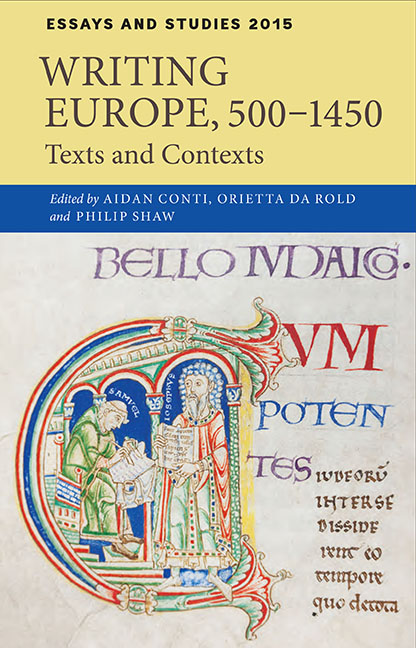Book contents
- Frontmatter
- Contents
- List of Illustrations
- Notes on Contributors
- Preface
- Acknowledgments
- List of Abbreviations
- Medieval Manuscript Studies: A European Perspective
- The DigiPal Project for European Scripts and Decorations
- Italian Giant Bibles: The Circulation and Use of the Book at the Time of the Ecclesiastical Reform in the Eleventh and Twelfth Centuries
- Isolation or Network: Arengas and Colophon Verse in Frisian Manuscripts around 1300
- Writing the Germanic Languages: The Early History of the Digraphs
, and The New Heathens: Anti-Jewish Hostility in Early English LiteratureLatin Composition in Medieval NorwayTranslating Europe in Medieval WalesCharms among the Chants: Verbal Magic in Medieval Bulgarian ManuscriptsIndexTranslating Europe in Medieval Wales
Published online by Cambridge University Press: 11 June 2021
ByBook contents- Frontmatter
- Contents
- List of Illustrations
- Notes on Contributors
- Preface
- Acknowledgments
- List of Abbreviations
- Medieval Manuscript Studies: A European Perspective
- The DigiPal Project for European Scripts and Decorations
- Italian Giant Bibles: The Circulation and Use of the Book at the Time of the Ecclesiastical Reform in the Eleventh and Twelfth Centuries
- Isolation or Network: Arengas and Colophon Verse in Frisian Manuscripts around 1300
- Writing the Germanic Languages: The Early History of the Digraphs , and
- The New Heathens: Anti-Jewish Hostility in Early English Literature
- Latin Composition in Medieval Norway
- Translating Europe in Medieval Wales
- Charms among the Chants: Verbal Magic in Medieval Bulgarian Manuscripts
- Index
Summary
ONE OF THE MOST SIGNIFICANT aspects of Welsh as a vernacular is its long continuity as a prestige language in Wales. While Middle English endured an extended and often painful struggle with Norman French before emerging triumphant as a relatively high-status language towards the end of the fourteenth century, Welsh never ceded its position as the prestige vernacular of the elite. Consequently, medieval literature in Welsh has an antiquity, a variety of registers and functions, and an awareness of its own long literary history that are unusual among the vernacular literatures of Europe.
This is not to say, however, that medieval Welsh literature was parochial or insular. The early conversion of Wales to Christianity in the fifth century nurtured a strong cultural tradition of Latin writing, mainly of a religious nature but also in the form of annals, chronicles, and philosophical works. From the twelfth century, the rapid foundation of a chain of priories and abbeys around Wales, particularly those of the Benedictines and Cistercians, enabled the keeping of substantial libraries which were shared among the various foundations and borrowed by noble families. Like England, Wales was subjected to conquest and colonisation by the Normans after 1066, with the crucial difference that Welsh literature retained its pre-eminence as a literary language alongside French. This was due in part to the politics and topography of Norman settlement in Wales, which divided the land into Marcher lordships held by the Normans (mainly in the east and south of the country) and independent patrimonial territories held by Welsh princes where the Welsh language retained institutional power.
In 1282, Llywelyn ap Gruffudd, prince of Gwynedd in north Wales, fell at the hands of the English army of Edward I and his entire territory, along with others ruled by Welsh princes, was annexed to the Crown. From 1284, Wales was divided into two different kinds of political unit, the Marcher lordships which operated separately from the king, and the Crown lordships, former Welsh princedoms, which were governed by a combination of English and Welsh administrators. The old Welsh aristocracy was brutally disposed of, by murder, imprisonment, or claustration, and the gentry class immediately below it in the hierarchy, the uchelwyr (literally ‘high men’), found itself called upon to serve the English monarchy.
- Type
- Chapter
- Information
- Writing Europe, 500-1450Texts and Contexts, pp. 159 - 174Publisher: Boydell & BrewerPrint publication year: 2015
- 1
- Cited by
Save book to Kindle
To save this book to your Kindle, first ensure coreplatform@cambridge.org is added to your Approved Personal Document E-mail List under your Personal Document Settings on the Manage Your Content and Devices page of your Amazon account. Then enter the ‘name’ part of your Kindle email address below. Find out more about saving to your Kindle.
Note you can select to save to either the @free.kindle.com or @kindle.com variations. ‘@free.kindle.com’ emails are free but can only be saved to your device when it is connected to wi-fi. ‘@kindle.com’ emails can be delivered even when you are not connected to wi-fi, but note that service fees apply.
Find out more about the Kindle Personal Document Service.
- Translating Europe in Medieval Wales
-
- Book: Writing Europe, 500-1450
- Online publication: 11 June 2021
×Save book to Dropbox
To save content items to your account, please confirm that you agree to abide by our usage policies. If this is the first time you use this feature, you will be asked to authorise Cambridge Core to connect with your account. Find out more about saving content to Dropbox.
- Translating Europe in Medieval Wales
-
- Book: Writing Europe, 500-1450
- Online publication: 11 June 2021
×Save book to Google Drive
To save content items to your account, please confirm that you agree to abide by our usage policies. If this is the first time you use this feature, you will be asked to authorise Cambridge Core to connect with your account. Find out more about saving content to Google Drive.
- Translating Europe in Medieval Wales
-
- Book: Writing Europe, 500-1450
- Online publication: 11 June 2021
×



